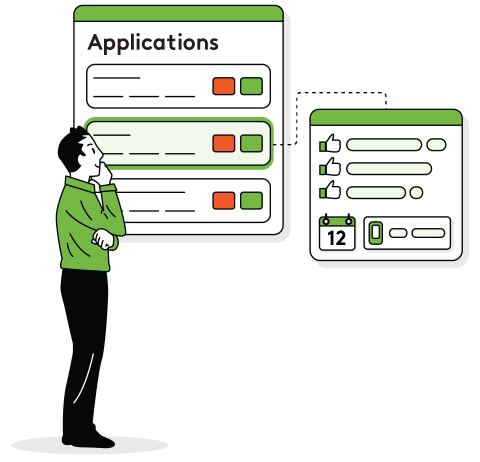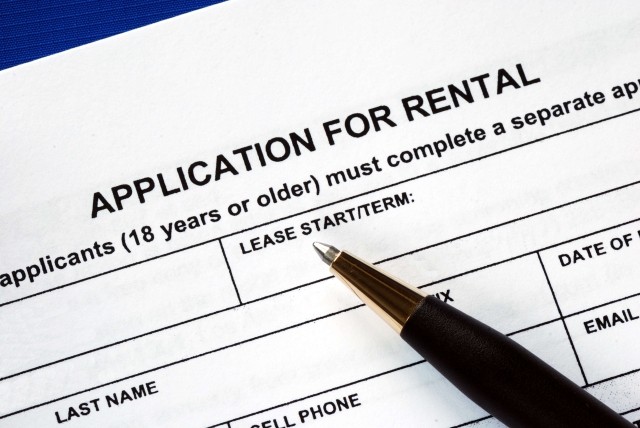
Being a landlord can be rewarding, but there are responsibilities and challenges. When you are renting a property, one concern is scams that target landlords. To protect yourself and your property, be aware of scams and take proper precautions. Knowing common renter red flags means you are better equipped to avoid falling victim to scams:
- Subletting
- Overpaying
- Not paying rent
- Faking documents
- Fake credit and background checks
- Eviction process
- Identity fraud
Subletting
Regardless of whether you permit subletting or not, you need to be aware of the scams that revolve around it. These scams are dangerous because they can interfere with your profit and cause new issues to deal with. A known scam is when a tenant will sublet to a stranger and collect several months’ rent upfront from them. Instead of using that money to pay rent, the tenant will pocket the money and disappear, leaving the landlord without rent and an unapproved person living at the property.
To prevent this, there are several measures you should take, such as making your stance on subleasing clear. If you allow subleasing, your lease you should detail guidelines regarding it and what could happen if those rules are violated. Even if you decide not to allow subleasing, you should still include a clause outlining the consequences if a tenant does sublease. In addition, thoroughly screening your tenants can help avoid potential issues. By looking for red flags in a renter’s background and credit check, you can decide if there are any risks associated with the tenant.
Overpaying
Rental properties are a huge investment, so you want to make sure you are getting a return on your investment. There are several scams involving overpaying and fake payments. A tenant can give you a check that has more than the amount agreed upon and ask for the difference back. You will send the difference back to the renter and deposit the check. However, as the check takes time to bounce, you won’t receive the funds of the check and be out the difference you paid.
There are several key actions to prevent these kinds of scams. The best way to deal with these scams is to refuse the payment and ask the renter only to pay the correct amount. One of the best ways to protect yourself is to do online payments. If the renter’s online payment fails, you will be notified, and no transaction will happen. This also prevents the potential issue of fake checks. If you decide to take checks, don’t assume you have the funds until the check has cleared.
Not Paying Rent
When you rent your home, you want a return on that investment. However, scammers don’t want to give you a penny more than they must. Scammers will pay what you require upfront, such as the security deposit and first month’s rent, move in, and never pay again. They rely on the fact that the eviction process takes time, and while the process plays out, they have a free place to stay.
To protect yourself from scammers, be sure to thoroughly screen your tenants and have clauses in the lease about the consequences of not paying rent. When you screen your tenant on Apartments.com, you will get credit, criminal, and eviction records to make an informed decision.
Faking Documents
With the internet, faking documents has become much easier to do and much harder to spot. You have to be diligent when asking for documents. Whether it be a document to prove income or a credit report, there are ways to combat this. When it comes to documents, be sure to verify all the information. If your tenant gives you their employment information, call to verify their employment. It may be a tedious process, but it can save you a lot of time and money later.
When you are verifying their information, whether it be previous landlords or employment, be sure to cross-reference the contact information on the application with what you can find in an online search. Checking the information against what you have found online can show any issues. If you cannot find any contact information online, contact the previous landlord or employer and pay close attention to their answers. If they give you in-depth answers, it is more likely that they are an actual landlord or employer and not a fake contact.
Fake Credit and Background Checks
Credit and background checks are vital to ensuring you are leasing to good tenants. However, scammers might not be able to pass typical credit and background checks or problems with their history will be revealed. To avoid any potential issues, scammers will provide fake credit and background checks and try to convince you not to run your own checks.
Ensuring you have accurate information about the applicants is why you should run all credit and background checks yourself. By running a credit check on a tenant, you can find out a lot of information about them to help you decide if they will be a reliable renter or not. When you screen with Apartments.com, you know you are getting the best information through a partnership with TransUnion.
Eviction Process
If you are in the process of evicting a tenant, there are strict guidelines you have to follow. If you violate any of those guidelines, it restarts the process, giving the tenant more time on your property. If you are evicting a tenant, be sure to review local laws and follow proper guidelines. Being aware of these laws and following them will make sure you do not reset the eviction process. If you violate one of these laws, such as accepting payment when you are evicting a tenant for non-payment, you won’t be able to evict them. Scammers take advantage of these laws and situations to get more time on the property.
Identity Fraud
Identity fraud is a crime that affects multiple people, from the victim whose identity got stolen to landlords who rent to people with fake identities. A scammer may use a stolen identity to apply to your property for a number of reasons. Maybe they wouldn’t pass the background or credit check. They could want to make it difficult to trace back to them when they rent out your property to someone else to make some money. This opens a whole set of potential problems, such as eviction, missing rent payments, and more. To fight against this, be sure to screen your tenants as well as have a list of questions to ask prospective tenants.
Screen Tenants with Apartments.com
Ensure you are renting to reliable tenants with Apartments.com. Through a partnership with TransUnion, Apartments.com provides all the information you need, such as background checks, credit checks, rental history, criminal history, and more. It is completely free for landlords.
FAQ
How do you become a landlord?
If you are considering becoming a landlord for the first time, it is not a decision to take lightly. As rewarding as the experience can be, there are a lot of responsibilities and challenges. If you decide to become a landlord, you will have to:
- Buy a property
- Calculate rental expenses
- Understand landlord-tenant laws
- Purchase landlord insurance
- Determine rent price
- Advertise your property
- Screen tenants
- Get your property ready for move-in
- Properly turn over your unit
- Stay organized
- Self-manage your property or hire out
- Work to retain tenants
How do you do a credit check on a tenant?
You can run a credit check by screening your tenants with Apartments.com. Applicants can apply to your property, or you can invite them to apply, and their background and credit check will appear with the application for you to review. On Apartments.com, landlords can run a credit and background check for free.
What do landlords look for in a credit check?
When you look at a credit check, pay attention to payment history, fraud indicators, and a summary of all active accounts. The actual credit score number represents the renter’s financial responsibility.
How do I do a background check on a tenant?
Conducting a background check on Apartments.com is part of the screening process. Whenever a potential renter applies, they will undergo the screening process, including a background and credit check.











